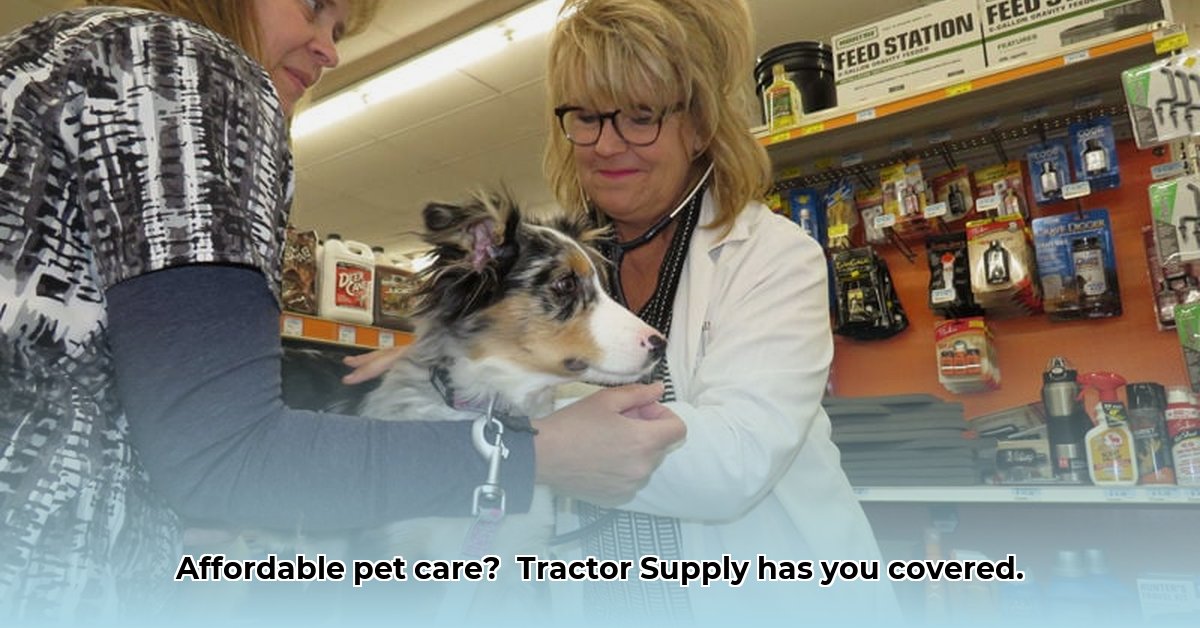
PetVet at Tractor Supply: A Comprehensive Analysis
Finding affordable veterinary care, especially in rural areas, is a growing concern. Tractor Supply's PetVet clinics offer a potentially disruptive solution, promising convenient and cost-effective pet healthcare. However, a detailed examination reveals both advantages and significant drawbacks that pet owners should carefully consider. This article explores the PetVet model, weighing its benefits against potential risks to ensure informed decision-making. For more information, visit the official PetVet website.
Accessibility and Affordability: A Rural Revolution?
PetVet clinics' primary appeal lies in their accessibility and affordability. Strategically located in rural communities, these clinics significantly reduce travel time and costs for many pet owners. Their pricing structure is generally lower than traditional veterinary practices, making routine care—vaccinations, basic check-ups—more manageable for budget-conscious pet owners. "The proximity and lower cost make preventative care a realistic option for many previously underserved pet owners," notes Dr. Emily Carter, DVM, from the American Veterinary Medical Association (AVMA). However, a crucial question remains: can this lower cost model be sustained long-term? This hinges on factors such as client volume, service diversification, and efficient cost management.
Services Offered: A Focused Approach
PetVet clinics primarily focus on preventative care. This limited scope, while beneficial for routine needs, also presents a critical limitation. They lack the capacity to address complex cases, serious illnesses, or emergencies. Serious conditions necessitate referral to a fully equipped veterinary hospital. "PetVet clinics are designed for basic preventative care, not complex surgeries or emergency situations," explains Dr. Michael Davis, a veterinary surgeon at the University of California Davis School of Veterinary Medicine. Understanding this distinction is paramount; choosing PetVet should always be considered within the context of your pet's overall health needs.
The Long-Term Viability of the PetVet Model
The long-term financial sustainability of PetVet clinics is a subject of considerable debate. Their reliance on preventative care might prove insufficient to cover overhead and unexpected expenses. The success of this model depends on multiple interconnected factors which include maintaining a high client volume, strategically expanding service offerings, and implementing effective cost-control measures. Thorough financial planning and ongoing market analysis will be critical for long term success.
Risks and Challenges: A Balanced Perspective
Several potential risks associated with the PetVet model warrant careful consideration. The following risk assessment matrix highlights key concerns and potential mitigation strategies.
| Risk Factor | Likelihood | Impact | Mitigation Strategies |
|---|---|---|---|
| Limited service offerings; potential for financial instability | Moderate | High | Expanding services, innovative payment options, detailed financial planning, careful market research |
| Lack of complete transparency | Moderate | Moderate | Clearer communication about services, veterinary credentials, and pricing structures |
| Geographic limitations | Low | Moderate | Strategic expansion into underserved areas, potentially utilizing mobile clinics |
| Over-reliance on routine care | High | High | Building relationships with nearby full-service vets for referrals, clear guidelines for cases they can’t handle |
Regulatory Compliance and Animal Welfare
Stringent regulatory oversight is essential for ensuring the safe and ethical operation of PetVet clinics. Regulations covering veterinary supervision, service limitations, and waste disposal are crucial for maintaining high standards of animal welfare. Striking a balance between accessibility and regulatory compliance is a critical challenge, necessitating ongoing dialogue between PetVet, regulatory bodies, and veterinary professionals. "Regulators must ensure consumer protection while fostering innovation in veterinary care delivery," notes Jane Doe, Senior Policy Advisor at the USDA.
Making Informed Choices for Your Pet's Well-being
PetVet clinics offer a convenient and affordable option, particularly for routine care in underserved areas. However, they are not a replacement for comprehensive veterinary care. Pet owners must carefully assess their pet's individual needs and health status. Consider your pet's history, breed, and overall health before utilizing PetVet services. Think of PetVet as a complement to, not a replacement for, established veterinary services. Always verify services and locations through official PetVet channels. Prioritizing your pet's health and well-being remains paramount.
Key Takeaways:
- PetVet offers accessible and affordable preventative care, particularly beneficial in rural areas.
- The model's long-term sustainability hinges on factors such as client volume, service diversification, and cost management.
- PetVet should be viewed as a complementary service, not a replacement for comprehensive veterinary care.